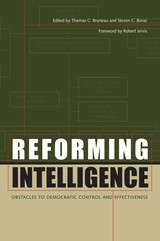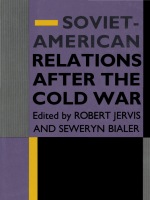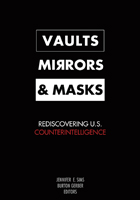
These days, it's rare to pick up a newspaper and not see a story related to intelligence. From the investigations of the 9/11 commission, to accusations of illegal wiretapping, to debates on whether it's acceptable to torture prisoners for information, intelligence—both accurate and not—is driving domestic and foreign policy. And yet, in part because of its inherently secretive nature, intelligence has received very little scholarly study. Into this void comes Reforming Intelligence, a timely collection of case studies written by intelligence experts, and sponsored by the Center for Civil-Military Relations (CCMR) at the Naval Postgraduate School, that collectively outline the best practices for intelligence services in the United States and other democratic states.
Reforming Intelligence suggests that intelligence is best conceptualized as a subfield of civil-military relations, and is best compared through institutions. The authors examine intelligence practices in the United States, United Kingdom, and France, as well as such developing democracies as Brazil, Taiwan, Argentina, and Russia. While there is much more data related to established democracies, there are lessons to be learned from states that have created (or re-created) intelligence institutions in the contemporary political climate. In the end, reading about the successes of Brazil and Taiwan, the failures of Argentina and Russia, and the ongoing reforms in the United States yields a handful of hard truths. In the murky world of intelligence, that's an unqualified achievement.

Moving beyond the boundaries of traditional studies of international relations, the contributors here focus on such topics as public opinion and the relationship of domestic policy to foreign policy. Other areas of consideration include the Soviet-U.S. relationship and the Third World and East Asia, the role of the United Nations in Soviet and American policy in the 1990s, international environmental protection, and the Soviet opening to nonprovocative defense. A final section concludes with policy choices for the future regarding security strategies and prospects for peace.
Contributors. Seweryn Bialer, Robert Dallek, Charles Gati, Toby Trister Gati, Colin S. Gray, Ole R. Holsti, Robert Jervis, Alexander J. Motyl, John Mueller, Eric A. Nordlinger, George H. Quester, Harold H. Sanders, Glenn E. Schweitzer, Jack Snyder, Donald S. Zagoria, William Zimmerman

Decision makers matching wits with an adversary want intelligence—good, relevant information to help them win. Intelligence can gain these advantages through directed research and analysis, agile collection, and the timely use of guile and theft. Counterintelligence is the art and practice of defeating these endeavors. Its purpose is the same as that of positive intelligence—to gain advantage—but it does so by exploiting, disrupting, denying, or manipulating the intelligence activities of others. The tools of counterintelligence include security systems, deception, and disguise: vaults, mirrors, and masks.
In one indispensable volume, top practitioners and scholars in the field explain the importance of counterintelligence today and explore the causes of—and practical solutions for—U.S. counterintelligence weaknesses. These experts stress the importance of developing a sound strategic vision in order to improve U.S. counterintelligence and emphasize the challenges posed by technological change, confused purposes, political culture, and bureaucratic rigidity. Vaults, Mirrors, and Masks skillfully reveals that robust counterintelligence is vital to ensuring America's security.
Published in cooperation with the Center for Peace and Security Studies and the George T. Kalaris Memorial Fund, Edmund A. Walsh School of Foreign Service, Georgetown University.
READERS
Browse our collection.
PUBLISHERS
See BiblioVault's publisher services.
STUDENT SERVICES
Files for college accessibility offices.
UChicago Accessibility Resources
home | accessibility | search | about | contact us
BiblioVault ® 2001 - 2024
The University of Chicago Press









